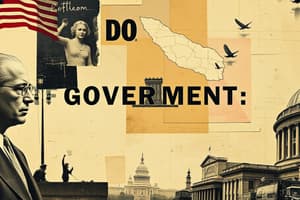Podcast
Questions and Answers
How do views on human nature influence the form of government that arises in a society?
How do views on human nature influence the form of government that arises in a society?
Views on human nature influence government forms by determining whether people advocate for harsh regimes or milder governments like democracy.
What was Plato's ideal form of government and what did he believe were its flaws?
What was Plato's ideal form of government and what did he believe were its flaws?
Plato's ideal government was led by a philosopher king, and he believed democracy was flawed because it allowed individuals to pursue selfish desires.
What historical context influenced Plato's views on government?
What historical context influenced Plato's views on government?
Plato's views were influenced by the civil wars and political turmoil in Athens, which created conflict between the wealthy and the poor.
How did Thomas Hobbes view human nature, and what implications did this have for his ideas on government?
How did Thomas Hobbes view human nature, and what implications did this have for his ideas on government?
What contrasting views on human nature and governance can be identified between Plato and Hobbes?
What contrasting views on human nature and governance can be identified between Plato and Hobbes?
What outcomes do societies typically manifest when human nature is seen as positive versus negative?
What outcomes do societies typically manifest when human nature is seen as positive versus negative?
Flashcards are hidden until you start studying
Study Notes
The Form a Government Takes
- The form a government takes is often influenced by how influential thinkers and leaders view human nature
- A negative view of human nature (as evil, self-seeking, and power hungry) tends to lead to harsh regimes
- A positive view of human nature (as kind and cooperative) tends to lead to milder forms of government, such as democracy
Ancient Greek Philosophers
- Plato (428-348 BCE) believed the ideal ruler was a philosopher king who ruled with grace and reason
- Plato thought democracy was flawed, as people pursued their own desires with little care for others or society
- Aristotle, along with Plato, outlined what an ideal government should be and how it should work over 2,000 years ago
Thomas Hobbes
- Thomas Hobbes (1588-1679) was an English philosopher who believed nature is in a constant state of war
- Hobbes had a pessimistic view of human nature, believing it led people to seek domination for personal gain, regardless of others' needs
- According to Hobbes, people live in a constant fear of violence, chaos, and death
Studying That Suits You
Use AI to generate personalized quizzes and flashcards to suit your learning preferences.




